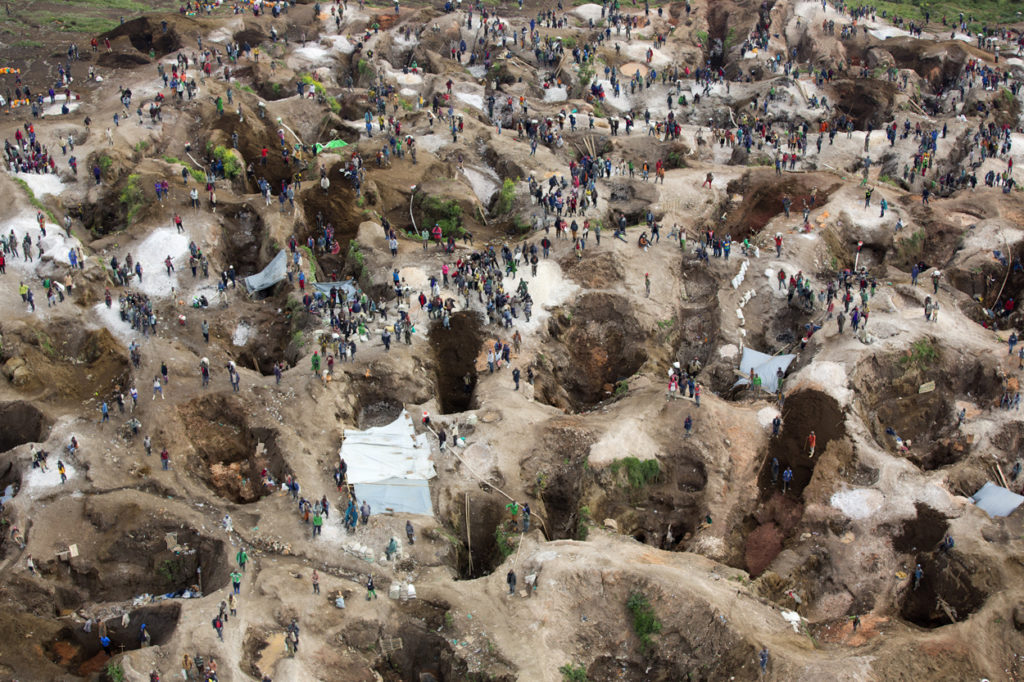
Luwowo Coltan mine near Rubaya, North Kivu. (MONUSCO/Sylvain Liechti)
The mining industry has recently descended on Cape Town for the Investing in African Mining Indaba conference, Africa’s biggest mining conference, which wrapped up last week. At the top of the agenda for many of the delegates was still the issue of cobalt, which companies such as Apple have moved to the category of conflict mineral in regards to sourcing it.
Despite moves by the Trump administration to relax laws on conflict minerals, a recent report by RCS Global’s Dr Nicholas Garrett, director at one of the world’s leading raw materials supply chain auditors, revealed the extent of the challenge to the market in finding ‘ethical’ supplies of the mineral, which is being mooted for inclusion in the controversial conflict minerals category.
Over 60% of the global cobalt supply comes from the Democratic Republic of Congo (DRC), where a legacy of civil war, the persistence of de-industrialized, basic forms of mining, and a weak state all come together to make ethical and transparent sourcing hugely challenging.
“[DRC] mining operations tend to be split between what is called artisanal and small scale mining […] where you have small, independent miners extracting cobalt but hand or with rudimentary tools. In the upstream you also have larger industrial miners extracting cobalt through modern mechanized mining techniques. In the DRC, some industrial mines purchase artisanal production to supplement their own industrial production. For the artisanal production cobalt ore is then sold through local traders who sell the mineral in bulk to international traders and buyers, including refiners,” Dr Garrett says.
In response to complaints of unsafe conditions or labour violations at these artisanal mines, some companies, including Apple, who rely on the mineral to help power their products, have already prescribed cobalt as a conflict mineral, overnight increasing the pressure on the wider electronics markets to do the same. But at the same time demand is set to rise in 2017 as the nascent electric vehicle market goes mainstream. The mineral’s provenance is rapidly becoming a bellwether issue for observers interested in how the wider minerals mining sector is evolving in terms of ethics and transparency.
“Increasingly regulators, NGOs and consumers are requiring brand companies to take a degree of responsibility for their activities in the supply chains […]. The worldwide response to conflict minerals has demonstrated that they do have the power to influence the entire supply chain.” Dr Garrett tells African Business.
The goal for downstream businesses from Tesla to Huwai is how to secure their cobalt supply in an increasingly squeezed market while also proving to their customers and regulators that their supply chain is transparent and ethical. In the last year, regulators in the U.S. and China have intimated that scrutiny will be further tightened while the EU formally announced it would implement a new framework and new regulation to force greater mineral supply chain transparency.
But the market is responding. According to Dr Garrett, RCS Global itself has researchers, advisors and auditors physically on the ground in mine sites in Africa and other producing regions plus staff in China, the U.S. and Europe who engage with the firms responsible for moving the mineral from mine to market Fine. His firm checks these actors’ facilities and activities as well as working with the industry bodies to develop the systems, processes and tools to support responsible sourcing of the mineral. Other auditors are also now offering similar services as demand for due diligence increases.
But downstream businesses are also directly addressing the issue of supply chain standards for themselves, setting up the Responsible Cobalt Initiative. The driving force behind the initiative is the Chinese Chamber of Commerce for Metals, Minerals and Chemicals Importers and Exporters, but companies ranging from HP to Sony are also involved.
Dr Garrett, this move is hardly surprising: “It is now both legally and ethically the responsibility of downstream companies—those that ultimately use the raw material in their products—to ensure actors in their supply chain are adhering to the highest standards.”
Meanwhile with the DRC set to remain the dominant player in the cobalt production, ensuring supply can be verified as ethical and transparent will be key for cobalt producers and downstream customers, he says. Over the last two years cobalt production there has remained stable at 63,000 metric tonnes with an increase in production possible in coming years, dwarfing its competitors.
He explains: “Sourcing can continue as long as [cobalt] shipments are tracked down to mine sites and the integrity of the chain of custody can be assured. There are systems out there, like the Better Sourcing Program, which operationalize hands on due diligence approach in the upstream and are designed to operate in conflict-affected and high-risk areas.”
If firms can secure ethical cobalt supplies he thinks, it will also go a long way to proving real progress in the wider African mineral sector. Only time will tell if this can be achieved but with the Trump administration now considering using an executive order to repeal U.S. legislation (part of the Frank-Dodd act) covering transparent supply chain sourcing in the name of reducing bureaucratic burdens on business, the issue is suddenly looking very topical.